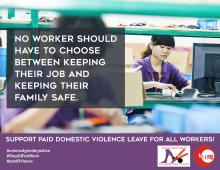Unions Demand Paid Leave for Survivors of Domestic Violence

On the International Day to Eliminate Violence Against Women (IDEVAW) trade unions are demanding governments and employers take stronger action to end sexual harassment and gender based violence.
“While the #MeToo movement has drawn global attention to the prevalence of sexual harassment, particularly in high profile industries, less attention has been given to the role employers and labour laws must have in providing safe workplaces. Effective workplace laws and policies can both stop workplace harassment and provide support for survivors of domestic violence’” said Kate Lappin, Regional Secretary of Public Services International, the Global Union Federation for workers delivering public services. A particular focus of the campaign is the demand for paid domestic violence leave “Paid leave will allow survivors, most of whom are women, to attend to urgent needs such as obtaining legal and medical help, securing housing and opening new bank accounts, without having to worry about discrimination or losing their job.”
Lappin said that in addition to providing practical support to survivors, paid domestic violence leave helps change discriminatory social norms, which is crucial to breaking the cycle of violence against women.
Worldwide, 1 in 3 women will experience a form of violence, WHO statistics show. In Australia, leaving a violent relationship costs $18,000 and 141 hours on average.
New Zealand became the second country to legislate for paid domestic violence leave this year. The Philippines introduced the right 14 years ago through its Anti-Violence Against Women and Their Children Act of 2004. Paid domestic violence leave is included in the draft ILO Convention and Recommendation on Violence and Harassment Against Women and Men in the World of Work and unions are insisting it be retained when the proposal is debated next year. But a number of governments and many employer representatives want to water down the instruments.
“It’s hard to believe that some governments and employers still don’t want to do everything possible to stop violence and harassment” said Annie Enriquez Geron, General Secretary of the Public Services Labor Independent Confederation (PSLINK) in the Philippines. “But we know that there are still attempts to weaken the proposed rules and we won’t stand for that” she added.
To kick off the campaign, PSI is launching a campaign toolkit on paid domestic violence leave, in observance of the International Day for the Elimination of Violence against Women and 16 Days of Activism and the theme “HearMeToo”.
In the media:
- Ghana: Modern Ghana
- USA: Oped News
- Pakistan: Pakistan Christian Post
- Saint Kitts and Nevis: Times Caribbean
- India: MAA Hyderabad News
- India - Madhya Pradesh and Chhattisgarh: Central Chronicle (editorial page)
- India - Mangalore: Mangalorean
- India - Kerala: Counter Currents
- Russia: Russia News Now
- New Zealand: Scoop
- India Citizen News
In Hindi
- Liveaaryaavart.com
- Original Citizen News Here
More information:
- Campaign Toolkit: Advance Labour Rights! End gender-based violence.
Use the toolkit online: http://paiddvleavenow.com/ - Campaign for an ILO Convention and Recommendation on “Ending violence and harassment in the world of work”
- PSI statement on International Day for the Elimination of Violence against Women: Ending workplace violence and harassment in public services

